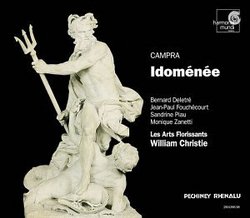| All Artists: Andre Campra, William Christie, Bernard Deletre, Jean-Paul Fouchécourt, Les Arts Florissants, Sandrine Piau, Monique Zanetti, Marie Boyer, Jérôme Correas, Kenneth Weiss, David Simpson, Anne-Marie Lasla Richard Dugay, Anne Pichard, Anne Mopin, Jean-Claude Sarragosse Mary Saint-Palais, François Bazola, Marcos Loureiro de Sa François Piolino, Emmanuel Balssa, Serge Saïtta, Hugo Reyne, Eric Bellocq Kevin Mallon Title: Campra - Idom�n�e / Deletr� � Fouch�court � Piau � Zanetti � Les Arts Florissants � Christie Members Wishing: 0 Total Copies: 0 Label: Harmonia Mundi Fr. Release Date: 11/16/1999 Album Type: Import Genre: Classical Styles: Opera & Classical Vocal, Chamber Music, Historical Periods, Baroque (c.1600-1750), Classical (c.1770-1830) Number of Discs: 3 SwapaCD Credits: 3 UPC: 794881480128 |
Search - Andre Campra, William Christie, Bernard Deletre :: Campra - Idom�n�e / Deletr� � Fouch�court � Piau � Zanetti � Les Arts Florissants � Christie
 | Andre Campra, William Christie, Bernard Deletre Campra - Idom�n�e / Deletr� � Fouch�court � Piau � Zanetti � Les Arts Florissants � Christie Genre: Classical |
Larger Image |
CD Details |
CD ReviewsA great work hcf | 06/27/2000 (5 out of 5 stars) "Campra's Idomenee (based on the same story as Mozart's Idomeneo) was first staged in 1712. Campra significantly reworked the score for the 1731 revival, and it is this second version of the opera that is recorded here. The opera follows the traditional tragedie-lyrique pattern having five acts and a prologue. But under Campra's pen (I mean, quill), the formalities of the genre are transformed into a genuine drama. The comparison between the 1712 and 1731 versions of the opera confirms Campra's intention to produce an emotionally realistic drama: the second version eliminated several minor characters and streamlined the plot thus achieving a better dramatic effect. Even the prologue serves not as a usual pastoral panegyric, but as a symbolic root of the human drama that follows - in the prologue, the goddess of love, Venus plots with the god of winds, Eole, to send a terrible storm on the ships of Idomenee returning home to Crete from their Trojan victories. This storm was, of course, the cause of Idomenee's terrible vow - in return for safe passage, he vowed to sacrifice the first person he sees ashore. I don't mean to claim that Campra's Idomenee is a realistic drama in the modern sense of the word, but parts of it are quite gripping. For example, the meeting of Idomenee and his son Idamante (who happens to be the first person Idomenee sees upon his return) shows Campra's considerable skill in combining music and drama. As another example, Idomenee's aria "O Neptune, recoy nos voeux" (a plea for mercy), which is echoed by the somewhat distant chorus, is very effective in conveying the cursed man's loneliness. The opera is written in a mixture of melodic recitative and arioso - a musical style that is very engaging if well used. The arias are relatively few (except as divertissments), but the recitatives themselves are so melodic that the arias are barely needed. This is one of the main features of French baroque that I really like: recitative actually has an independent musical value. The singers here are marvelous, especially haute-contre Jean-Paul Fouchecourt as Idamante (THE man for this kind of role) and bass Bernard Deletre as Idomenee. In addition, Sandrine Piau makes a truly electric Electre! Well, if you're not familiar with French baroque, this is going to be different, but hopefully you won't be disappointed." Fascinating version of the opera Mozart employed David Fletcher Noble | Highlands Ranch, CO United States | 04/23/2004 (5 out of 5 stars) "The music William Christe directs is always wonderful! This is a powerful opera where the singers really express the feelings each role demands. Ilione's "Espoir des Malheureux" shares her feelings of delight of being avenged, then suddenly expresses her love and worry for Idamante. Their duet "Ah! quel bonheur de vous revoir!" is so moving and tender as they speak their ecstasy of love. Bernard Deletre sings a profound, solemn, and emotional Idomeneo. His outbursts can well frighten the listener as well as move. But I hate Electra! I want to strangle her! I want to torment her soul! *David rams into Electra and slaps her in the face* You'd better be scared of my revenge, cruel woman!!! I think her jealousy aroused Idomeneo to kill his own son in this version of the opera. Though Mozart's version has a happier conclusion. The emsemble is crisp, clear, and creates a fascinating atmosphere."
|
